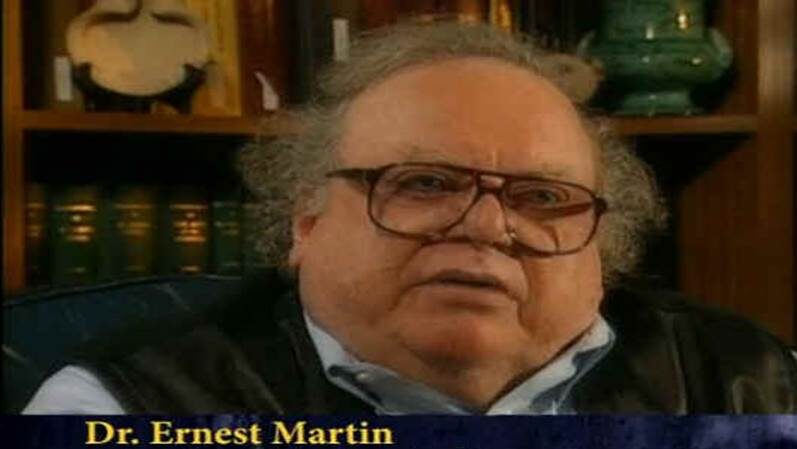We continue, from part 1, part 2, part 3, part 4, part 5, part 6, part 7, considering Ernest L. Martin, Ph.D.’s article titled, “Lingering Idolatry in the Temple of God,” AskELM (as in Ask Ernest L. Martin about whom I previously wrote Nightmare on AskElm Street – angelic “Sons of God”?), September 1, 2000 AD which contains some interesting point, some thought provoking speculations and some very serious errors.
Within the Bible ‘ohel (Strong’s H168) simply refers to a tent and was used of that which is translated both as tent and tabernacle for the portable structure in which services were held after the Exodus wilderness wandering. Within the Amos 5 text the term tabernacle consists of the only biblical usage of the Hebrew term cikkuwth (or sikkuth: Strong’s H5522) which is another word for tent.
Thus, at some point in the wilderness for forty years, Israel borne the tent/tabernacle of melek simply king (Strong’s H4428) and kiyuwn meaning an image or a pillar (Strong’s H3594) or/for their images, the star of their ‘elohiym as in authoritative, mighty, etc., (Strong’s H430) which they made.
Now, there is a specific Moloch or Molech which in Hebrew is Molek (Strong’s H4432) which was an Ammonite and Phoenician god to whom rebellious Israelites sacrificed children.

Acts 7:42-44 reiterates this by noting, “Then God turned, and gave them up to worship the host of heaven…Yea, ye took up the tabernacle of Moloch, and the star of your god Remphan, figures which ye made to worship them: and I will carry you away beyond Babylon.”
Moloch is the straight transliteration form the Greek (Strong’s G3434), Remphan is from a Greek Rhaiphan (Strong’s G4481) “the shrunken (as lifeless)” and is a Greek version of Chiun/cikkuwth with both the Hebrew and Greek appearing to refer, in part, to Saturn. Remphan is how the Septuagint/LXX translates the Amos 5 text.
Now, Martin takes the Amos and Acts statement to refer to the God commanded ark, tent, etc. and thus, turns the God commanded ark, tent, etc. into an idolatrous aspect of the “odious and bad commands given by God” as Martin put it. The Jamieson-Fausset-Brown Bible Commentary has the hilarious statement that it was a “tabernacle: small enough not to be detected by Moses” and yet, the point is that we do not seem to learn of this within records of the Exodus’ wilderness travels, etc.
Joshua 24:15 contains the famous statement that “if it seem evil unto you to serve the LORD, choose you this day whom ye will serve; whether the gods which your fathers served that were on the other side of the flood, or the gods of the Amorites, in whose land ye dwell: but as for me and my house, we will serve the LORD.” Judges 5:8 relates that “They chose new gods.”
Deuteronomy 31:21 referred to “their imagination which they go about, even now, before I have brought them into the land which I sware” with verse 27 stating, “For I know thy rebellion, and thy stiff neck: behold, while I am yet alive with you this day, ye have been rebellious against the LORD.”
Perhaps this was a case of an Ezekiel 8 incident wherein the Temple appeared to be functioning as intended and yet, God reveals the following about what was really occurring therein:
…brought me [Ezekiel] in the visions of God to Jerusalem, to the door of the inner gate that looketh toward the north; where was the seat of the image of jealousy, which provoketh to jealousy…the great abominations that the house of Israel committeth…I went in and saw; and behold every form of creeping things, and abominable beasts, and all the idols of the house of Israel…every man his censer in his hand; and a thick cloud of incense went up…what the ancients of the house of Israel do in the dark, every man in the chambers of his imagery?…women weeping for Tammuz…men, with their backs toward the temple of the LORD, and their faces toward the east; and they worshipped the sun…they put the branch to their nose…
To reiterate, Amos records God as asking “Have ye offered unto me sacrifices and offerings in the wilderness forty years, O house of Israel?” with the next statement beginning in the Hebrew with a simple reference to lifting, bearing up, carrying, taking, etc. the tabernacle of your king/Moloch and Chiun your images, the star of your god, which ye made to yourselves.
God seems to be asking, “Have ye offered unto me sacrifices and offerings in the wilderness forty years, O house of Israel? Or was it to false gods?” in the sense of “Have ye offered unto me sacrifices and offerings or was it to other gods; did you bare my tabernacle or that of your Moloch and Chiun…,” etc.
In other words, Martin claims that God’s tabernacle and images were actually of false gods, it may be that they carried God’s but also another to false gods but it seems to be that God is either asking the rhetorical question as I noted above and/or making the point that it was an Ezekiel 8 situation whereby they carried His outwardly but inwardly were rebelling against Him and serving false gods.
